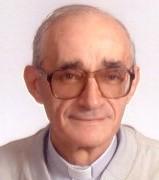Daniel Comboni
Misjonarze Kombonianie
Obszar instytucjonalny
Inne linki
Newsletter
In Pace Christi
de Sousa Rogério Artur
It was clear that Fr. Rogério Artur de Sousa was nearing his end. He spoke little and liked to sit in the sanctuary, close to the Blessed Sacrament, while the community prayed Lauds with the Comboni Sisters and some lay people. Even so, he had not lost his sense of humour: the last time we met, he tapped me on the head with his inseparable walking stick saying: “Provincial, you will keep on growing, won’t you?!”
On 15 June he was admitted with heart failure to the hospital of Saint Theotonius in Viseu where he stayed for a week. On 24 June he could not take his supper and went to his room. The medical guard, who was called because the Father found it hard to breathe, could only confirm his death. Fr. Rogério went up to heaven on the day the Church celebrated the birth of St. John the Baptist; the Dean of the Portuguese Combonis was 84 years old.
Fr. Rogério was born on 29 April, 1933, at Sargaçais, in the parish of Souto de Aguiar, in the commune of Aguiar, Beira, of António Augusto de Sousa and Rosa de Jesus, famers by profession. Of the eight children, two girls and six boys, five entered the religious life. One of the girls became Sister Dorotea and the four boys joined the Comboni Missionaries. Two became priests: Fr. Rogério and Fr. José de Sousa; and two became Brothers: Bro. Miguel dos Santos, who died at Coimbra in 1979, and Bro. Jorge Fernandes de Sousa who left the Institute in Brazil.
Fr. Rogério entered the Major Seminary of Viseu in 1951. After the novitiate at Gozzano (Italy), he took first vows in Viseu on 9 September, 1954, together with Bro. António Martins da Costa – the first two Portuguese to be professed, seven years after the Combonis arrived in Viseu.
He studied theology first at Venegono, from 1954 to 1957, and then at Viseu, the following year. He made his final profession on 10 March, 1958 and was ordained priest on 27 July, at Viseu, where he stayed as a teacher until 1960.
That same year he left for Mozambique and the mission of Lunga. He returned to Portugal in 1962 and joined the team of the magazine Além-Mar, at Paço de Arcos. Two years later, he was assigned to Vila Nova de Famalicão as formator at the minor seminary.
In 1967, he again left for Mozambique as a military chaplain and, three years later, he returned to active missionary service in various missions of the diocese of Nampula: Carapira (1970-1971), Nacala (1971-1974), Mossuril (1974-1976) and Memba (1976-1987).
Fr. Rogério formed part of the group of eleven Combonis expelled from Mozambique on 13 April, 1974, as a result of the Obligation of Conscience written by Bishop Manuel Vieira Pinto and the Comboni Missionaries. He returned to Mozambique as soon as the political situation allowed.
In 1987 he was again in Portugal and stayed at Lisbon until 1993, editing the magazines. Besides writing (he would sign many articles with his own name and others with a pseudonym) he translated material from Italian to Portuguese.
After spending two years outside the community, he went to Vila Nova de Famalicão where he heard confessions and then, in 2013, he went to Viseu and the Hospitality Centre of the province.
Fr. Rogério was a humble missionary and full of zeal, with a great devotion to the Divine Mercy. He tried to start a lay movement – Missionaries of Divine Mercy – inspired by the writings and visions of Saint Faustina, the fruit of an old feeling of restlessness: “For many years now I have felt the need to reveal and manifest to all the Mercy of God, so that in these times of confusion and estrangement from God, both people and the world itself may rediscover with joy ‘the waters of Salvation’ that the Pierced Heart of Jesus never ceases to show us”. He belonged to the charismatic movement and had proposed to the superiors some research on the theme of Comboni and the Holy Spirit, a theme on which he intended to write a book.
“He was always and in everything a Comboni Missionary – his brother Fr. José de Sousa affirms – and always took life and his ‘yes’ to Comboni very seriously. In spreading the devotion to the Divine Mercy, by means of his books, a theme fully assumed by St. John Paul II with the feast of Divine Mercy, he came in for some exaggerated and unjust criticism. He united his sufferings with those of the Cross and placed himself totally in the hands of God, setting aside all that made him suffer so much. His devotion to St. Pio da Pietrelcina was his comfort and made him docile to the will of God”. (Fr. José Vieira).
Da Mccj Bulletin n. 274 suppl. In Memoriam, gennaio 2018, p. 109-113.

